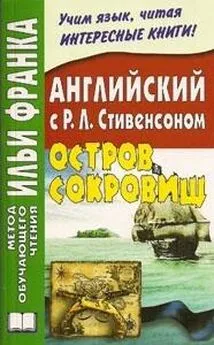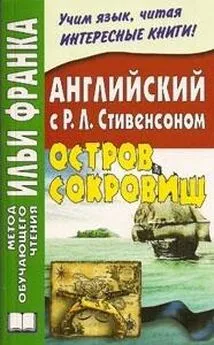Илья Франк - Английский язык с Р.Л. Стивенсоном. Остров сокровищ
- Название:Английский язык с Р.Л. Стивенсоном. Остров сокровищ
- Автор:
- Жанр:
- Издательство:неизвестно
- Год:неизвестен
- ISBN:нет данных
- Рейтинг:
- Избранное:Добавить в избранное
-
Отзывы:
-
Ваша оценка:
Илья Франк - Английский язык с Р.Л. Стивенсоном. Остров сокровищ краткое содержание
Английский язык с Р.Л. Стивенсоном. Остров сокровищ - читать онлайн бесплатно ознакомительный отрывок
Интервал:
Закладка:
kind, young friend, and lead me in?'
Мультиязыковой проект Ильи Франка www.franklang.ru
71
1. I held out my hand (я протянул свою руку), and the horrible, soft-spoken,
eyeless creature (и ужасное, с вкрадчивым голосом, безглазое существо; soft-
spoken — мягкий, тихий, учтивый ) gripped it in a moment like a vice (схватило
ее тотчас, точно клещами; vice — клещи, тиски ). I was so much startled that I
struggled to withdraw (я был так напуган, что попытался вырваться; to struggle
— бороться, стараться; to withdraw — отдернуть /руку/, удаляться ); but the
blind man pulled me close up to him with a single action of his arm (но слепой
притянул меня близко к себе единственным действием = одним движением
руки).
2. 'Now, boy (теперь, мальчик),' he said, 'take me in to the captain (веди меня к
капитану).'
3. 'Sir (сэр),' said I, 'upon my word I dare not (честное слово, я не смею)…'
4. 'Oh,' he sneered (он усмехнулся), 'that's it (вот как)! Take me in straight (веди
меня немедленно; straight — прямо, точно, сразу ), or I'll break your arm (или я
сломаю тебе руку).'
сreature [`krJCq] vice [vaIs] withdraw [wID`drL] straight [streIt]
1. I held out my hand, and the horrible, soft-spoken, eyeless creature gripped
it in a moment like a vice. I was so much startled that I struggled to withdraw;
but the blind man pulled me close up to him with a single action of his arm.
2. 'Now, boy,' he said, 'take me in to the captain.'
3. 'Sir,' said I, 'upon my word I dare not.'
4. 'Oh,' he sneered, 'that's it! Take me in straight, or I'll break your arm.'
Мультиязыковой проект Ильи Франка www.franklang.ru
72
1. And he gave it, as he spoke, a wrench that made me cry out (и он, говоря это,
/так/ повернул мою руку: «дал скручивание», что /это/ заставило меня
вскрикнуть).
2. 'Sir,' said I, 'it is for yourself I mean (это /опасно/ для вас, я имею в виду). The
captain is not what he used to be (капитан /теперь/ не тот, которым он был
раньше). He sits with a drawn cutlass (он сидит с обнаженным кортиком).
Another gentleman (один джентльмен) — — '
3. 'Come, now, march (живо, марш),' interrupted he (перебил он); and I never
heard a voice so cruel, and cold, and ugly as that blind man's (и я никогда не
слыхал такого жестокого, холодного и противного голоса, как у этого
слепого). It cowed me more than the pain (он напугал меня больше, чем боль);
and I began to obey him at once (и я начал подчиняться ему сразу же), walking
straight in at the door and towards the parlour (входя прямиком в дверь и
/направляясь/ к залу; towards — по направлению, к, на ), where our sick old
buccaneer was sitting, dazed with rum (где наш больной старый пират сидел,
одурманенный ромом; to daze — изумлять, поражать, ошеломлять ). The
blind man clung close to me (слепой прицепился ко мне; to cling —
прилипнуть, прицепиться ), holding me in one iron fist (держа меня в одном
железном кулаке = стальными пальцами), and leaning almost more of his
weight on me than I could carry (и навалясь почти большим своим весом на
меня, чем я мог вынести = навалясь так, что я еле держался на ногах; to lean
— прислоняться, опираться; to carry — нести, выдержать ).
4. 'Lead me straight up to him (веди меня прямо к нему), and when I'm in view (и
когда я /буду/ в пределах видимости = когда он меня увидит), cry out, "Here's
a friend for you, Bill (крикни: «Вот друг ваш, Билл»)." If you don't, I'll do this
(если не крикнешь, я сделаю это);'
Мультиязыковой проект Ильи Франка www.franklang.ru
73
wrench [renC] buccaneer [bAkq`nIq] weight [weIt] view [vjH]
1. And he gave it, as he spoke, a wrench that made me cry out.
2. 'Sir,' said I, 'it is for yourself I mean. The captain is not what he used to be.
He sits with a drawn cutlass. Another gentleman — — '
3. 'Come, now, march,' interrupted he; and I never heard a voice so cruel, and
cold, and ugly as that blind man's. It cowed me more than the pain; and I
began to obey him at once, walking straight in at the door and towards the
parlour, where our sick old buccaneer was sitting, dazed with rum. The blind
man clung close to me, holding me in one iron fist, and leaning almost more of
his weight on me than I could carry.
4. 'Lead me straight up to him, and when I'm in view, cry out, "Here's a
friend for you, Bill." If you don't, I'll do this;'
1. And with that he gave me a twitch (и при этом он /так/ дернул /руку/; twitch
— рывок, дерганье ) that I thought would have made me faint (что я подумал,
/это/ заставит меня потерять сознание). Between this and that (между этим и
тем = при этом), I was so utterly terrified of the blind beggar (я был так крайне =
до смерти напуган слепым нищим) that I forgot my terror of the captain (что
забыл свой страх перед капитаном), and as I opened the parlour door (и открыв
дверь зала), cried out the words he had ordered in a trembling voice (выкрикнул
слова, /которые/ он приказал, дрожащим голосом).
2. The poor captain raised his eyes (бедный капитан поднял глаза), and at one
look the rum went out of him (и вмиг: «с одного взгляда» ром покинул его; to
Мультиязыковой проект Ильи Франка www.franklang.ru
74
go out — выйти, кончиться, испортиться ), and left him staring sober (и
оставил его глазеющим трезво). The expression of his face was not so much of
terror as of mortal sickness (выражение его лица было = на лице отразился не
страх, а скорее смертельная болезнь = мука). He made a movement to rise (он
сделал движение, чтобы подняться), but I do not believe he had enough force
left in his body (но я не верю = видимо, у него не было достаточно сил,
оставшихся в теле).
3. 'Now, Bill, sit where you are (нет, Билл, сиди где сидишь),' said the beggar
(сказал нищий). 'If I can't see, I can hear a finger stirring (если я не могу видеть
= хоть я и не вижу, /зато/ могу слышать, /даже когда/ шевельнешь пальцем;
finger — палец; to stir — шевелить(ся); двигать(ся) ). Business is business (дело
есть дело). Hold out your left hand (протяни свою левую руку). Boy, take his
left hand by the wrist (мальчик, возьми его левую руку за запястье), and bring it
near to my right (и поднеси к моей правой).'
faint [feInt] utterly [`AtqlI] beggar [`begq] force [fLs] stirring [`stq:rIN] wrist
[rIst]
1. And with that he gave me a twitch that I thought would have made me
faint. Between this and that, I was so utterly terrified of the blind beggar that
I forgot my terror of the captain, and as I opened the parlour door, cried out
the words he had ordered in a trembling voice.
2. The poor captain raised his eyes, and at one look the rum went out of him,
and left him staring sober. The expression of his face was not so much of
terror as of mortal sickness. He made a movement to rise, but I do not believe
he had enough force left in his body.
Мультиязыковой проект Ильи Франка www.franklang.ru
75
3. 'Now, Bill, sit where you are,' said the beggar. 'If I can't see, I can hear a
finger stirring. Business is business. Hold out your left hand. Boy, take his left
hand by the wrist, and bring it near to my right.'
1. We both obeyed him to the letter (мы оба подчинились ему в точности: «до
буквы»), and I saw him pass something from the hollow of the hand (и я видел,
как он передавал что-то из впадины своей руки = ладони) that held his stick
into the palm of the captain's (которая держала палку, в ладонь капитана),
which closed upon it instantly (которая сжала это /полученное/ сразу же:
«закрылась на этом мгновенно»).
2. 'And now that's done (теперь это /дело/ сделано),' said the blind man (сказал
слепой); and at the words he suddenly left hold of me (при этих словах он
внезапно отпустил меня), and, with incredible accuracy and nimbleness (и, с
невероятной точностью и проворством; accuracy — правильность,
тщательность, верность ), skipped out of the parlour and into the road
(выскочил из зала на дорогу; to skip — прыгать, убегать, пропускать ), where,
as I still stood motionless (где, так как я все еще стоял неподвижно), I could
hear his stick go tap-tap-tapping into the distance (я мог слышать, как его палка
Читать дальшеИнтервал:
Закладка:


